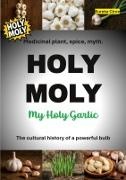Read more
Garlic -
Medicinal plant, magic herb, and cultural treasure
For thousands of years, garlic has been used as food, medicine, and a magical plant in cultures around the world.
From the Egyptian pyramid builders to the soldiers of antiquity to modern cuisine, garlic has always enjoyed a reputation for strengthening the body and protecting against disease. Over the course of history, it became known as "Russian penicillin" on battlefields, served as a magical plant to ward off evil spirits, and finally established itself in modern phytotherapy as a recognized medicinal plant.
But garlic is much more than just a simple natural remedy. It is a cultural symbol, an ingredient that creates identity and can transcend boundaries. Its distinctive smell symbolizes closeness and distance: as a spice, it creates culinary connections, but can also draw social boundaries.
HOLY MOLY - My Holy Garlic invites you on an exciting journey through botany, medicine, mythology, sociology, and culinary diversity - and makes you want to enjoy the bulb in a new way and discover how this seemingly simple plant found its way from the field to the world of pop culture and gourmet cuisine.
About the author
Eureca Circe:
The publisher and curator Eureka Circe is continuing beyond this volume, "HOLY MOLY" - My Holy Garlic -
- with the medical book series "HERBAL LOVE" on individual medicinal herbs for the most common folk diseases,
- with the volume "HERBAL HARMONY" on medicinal herb mixtures,
- and the volumes "HERBAL PEOPLE" about the most famous personalities in natural medicine
- also with the theological book series "DEUS EX MACHINA"
for the documentation and, where appropriate, discussion of texts on artificial intelligence in a religious and theological context.
Her thesis: "Artificial intelligence (AI) represents a profound turning point because it fundamentally changes the relationship between humans, knowledge, and access to the world - not only technically, but also culturally, epistemologically, and socially. It opens up new ways of accessing knowledge and leads to its proliferation and democratization: AI systems make information easily accessible - often without the need for traditional reading or in-depth prior knowledge. This fundamentally changes how we think, learn, and understand, while also promoting a new form of individualized thinking - which can also be exemplified in spiritual belief. What's more, machines today generate meaning - texts, images, arguments - where previously only human expertise was required. This has long-term consequences for education, science, politics, and religion."

